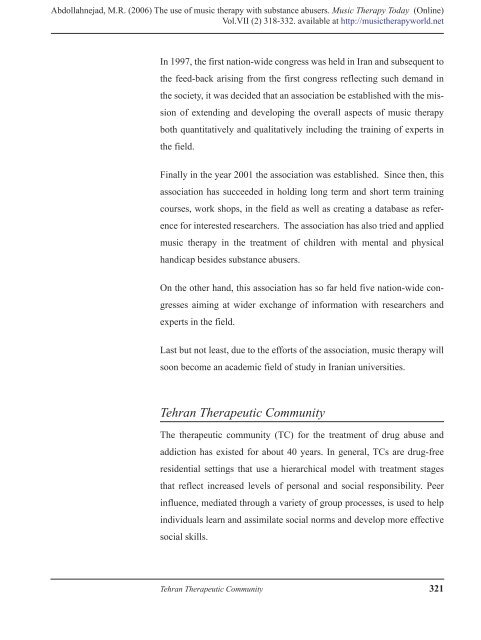Music Therapy Today - World Federation of Music Therapy
Music Therapy Today - World Federation of Music Therapy
Music Therapy Today - World Federation of Music Therapy
Create successful ePaper yourself
Turn your PDF publications into a flip-book with our unique Google optimized e-Paper software.
Abdollahnejad, M.R. (2006) The use <strong>of</strong> music therapy with substance abusers. <strong>Music</strong> <strong>Therapy</strong> <strong>Today</strong> (Online)<br />
Vol.VII (2) 318-332. available at http://musictherapyworld.net<br />
In 1997, the first nation-wide congress was held in Iran and subsequent to<br />
the feed-back arising from the first congress reflecting such demand in<br />
the society, it was decided that an association be established with the mis-<br />
sion <strong>of</strong> extending and developing the overall aspects <strong>of</strong> music therapy<br />
both quantitatively and qualitatively including the training <strong>of</strong> experts in<br />
the field.<br />
Finally in the year 2001 the association was established. Since then, this<br />
association has succeeded in holding long term and short term training<br />
courses, work shops, in the field as well as creating a database as refer-<br />
ence for interested researchers. The association has also tried and applied<br />
music therapy in the treatment <strong>of</strong> children with mental and physical<br />
handicap besides substance abusers.<br />
On the other hand, this association has so far held five nation-wide con-<br />
gresses aiming at wider exchange <strong>of</strong> information with researchers and<br />
experts in the field.<br />
Last but not least, due to the efforts <strong>of</strong> the association, music therapy will<br />
soon become an academic field <strong>of</strong> study in Iranian universities.<br />
Tehran Therapeutic Community<br />
The therapeutic community (TC) for the treatment <strong>of</strong> drug abuse and<br />
addiction has existed for about 40 years. In general, TCs are drug-free<br />
residential settings that use a hierarchical model with treatment stages<br />
that reflect increased levels <strong>of</strong> personal and social responsibility. Peer<br />
influence, mediated through a variety <strong>of</strong> group processes, is used to help<br />
individuals learn and assimilate social norms and develop more effective<br />
social skills.<br />
Tehran Therapeutic Community 321

















